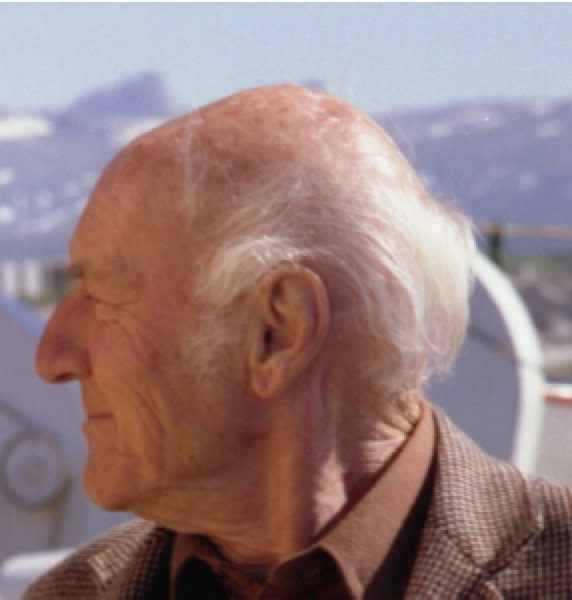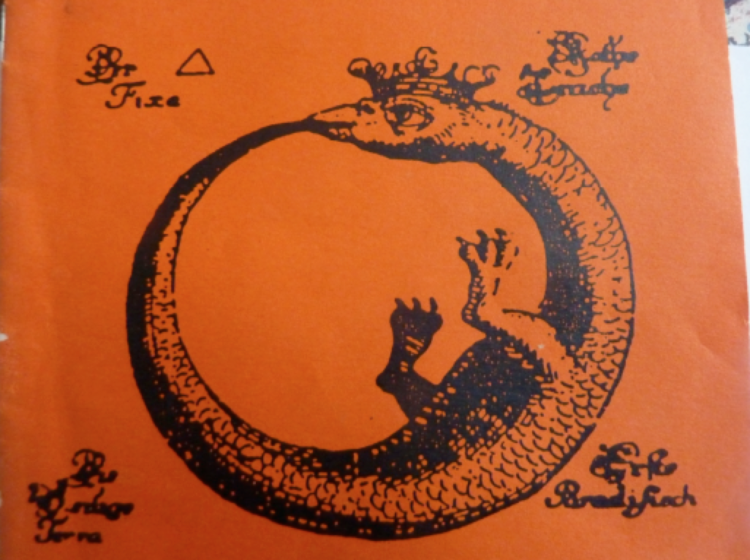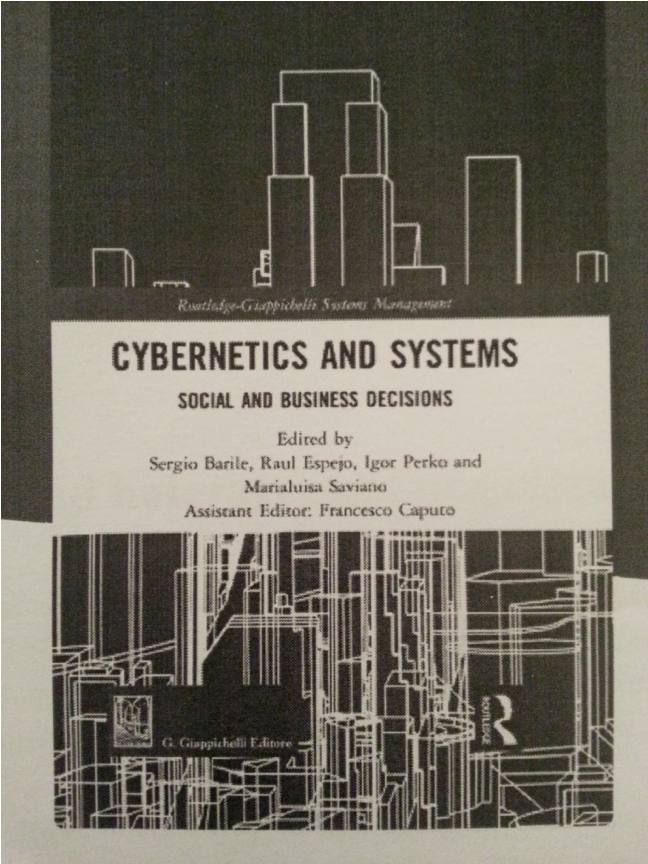HEINZ VON FOERSTER, was born in Vienna in 1911, graduated in Physics from the Institute Of Technology at the University of Vienna. In 1949 he moved to the United States and joined the Department of Electrical Engineering at the University of Illinois at Urbana. During that time he also edited the transcripts of the Cybernetics Conference Program of the J.H.Macy Foundation, an American Foundation for medical research.
In 1958 he founded the Biological Computer Laboratory (BCL) in Urbana, Illinois, a laboratory of international and interdisciplinary research into the physiology, theory, technology and epistemology of cognitive processes which he ran until 1976.
He was president of the Wenner-Green Foundation for Anthropological Research (1963-65) and of The Society For General System Research (1976-77).
A selection of his many articles called OBSERVING SYSTEMS was edited in an Italian translation by Astrolabio and called I SISTEMI CHE OSSERVANO (edited by M.Ceruti and U.Telfener). Other writings by Von Foerster were CIBERNETICA E EPISTEMOLOGIA: HISTORY AND PERSPECTIVES (edited by G.Bocchi and M.Ceruto) in LA SFIDA DELLA COMPLESSITÀ (Feltrinelli, Milano, 1985), and A CONSTRUCTIVISTIC EPISTEMOLOGY in Cahiers de la Fondation “Archives Jean Piaget” n.2-3, 1982.
L.Segal has published a volume on von Foerster’s work and thought called THE DREAM OF REALITY. THE CONSTRUCTIVISM OF H.VON FOERSTER (Norton Press, New York, 1986). Heinz has died in in 2002 in Pescadero where he lived, in California.
Heinz, an often quoted phrase of yours says: “The observer who observes his own observation”. It would seem a task for both the epistemologist and the psychotherapist. What is the parallel between the two?
They are both the same, using different names. As I observe the therapeutic process I am amazed and mindful of the epistemological work it entails. The effort to explore the modalities that generate, through dialogue, both knowledge and new frameworks, is constant. If there is dialogue, that is if everyone is listening, and the important fact becomes that everyone listens and would like to use the words the others use, a new perspective is generated. The moment we listen to each other we find ourselves with different material: understanding, interpretation, is a constant process.
The attention of those participating in the dialogue is amplified. Individuals can even surprise themselves, not just observe themselves from a different perspective; you can see shock in their eyes, astonishment at having made a connection never before made. People have to become poets, and they do so as a result of the questions asked by the therapist: it is important, for example, to ask questions that people had not previously contemplated. These people, in order to answer, have to invent, to become poets.
To create a context for listening and to ask questions to amplify the potential for dialogue. Are these the epistemological tools in the hands of the psychotherapist?
I am fascinated that the only tool, the only medicine at your disposal in therapeutic work is the word. My feeling is that we should be paying far greater attention to language. My interest springs from a specific aspect, namely the (profezie performative) invented by John Austin in the 1950s. These were phrases in which action and word fused. The phrase does what it says: if I bump into someone and say I’m sorry, the very asking excuses me. A priest stands before a young couple and declares them husband and wife. What happens? Now they are man and wife. It is a magic enchantment that does what it says and the magic consists precisely in making spirits real by simply conjuring them.
It seems essential to consider what the magic of language achieves in the therapeutic context. The majority of therapists risks not paying enough attention to words and language, the tools that serve to underline and invent reality. People are invited to become poets through being asked questions. A question, and this is fascinating, has no meaning when it is being asked. It only assumes meaning when it is answered: the person answering has to invent and activate a process of autocreation.
Are you saying that through “the use of language” (Languaging, Maturana 1980) we invent ourselves, we create ourselves? Are you saying that the ‘languaging’ in therapy allows us to construct a person different from the one that started the therapy?
Absolutely. A therapeutic tool is to ask the most ambiguous and open questions possible. To use the structure of the situation to force others to become creative. Usually people refuse to invent because they regard it as dangerous. In the therapeutic context it becomes less dangerous to invent than to define oneself.
We have a fascinating double-edged language that allows us to constantly mix it up. It appears to refer to things, but then as we use it it really refers only to the notion that each one of us has about things. It appears monologic and denotative but functionally it is connotative, it does something for you. It’s about dialogue: my language comes back to me through you. In a dialogue I am talking to me through you.
Is only language important?
Non verbal signs are constantly exchanged in any interaction. John Lylly’s studies on dolphins, his “Clever Hans”, demonstrate the importance of the non verbal even in animals. The magic of interaction: it is the combination of things that produces magic.
The difference between magic and science lies in the fact that magic does not work through cause and effect but through correlations.
The therapist has to see and help, to work as a catalyst, using both the verbal and the non verbal. He must offer the patients experiences that allow them to construct a world in which they can live.
What then is the role of creativity, of fantasy, of imagination in producing change and in the growth of knowledge?
The capacity to be creative and imaginative with others is the essence of being a human being, in the words of Martin Buber. More precisely, we are not “human beings” but human in “becoming” not “being”: I invite everyone to that wonderful way of thinking wherein we are all in the process of becoming and thinking of ourselves in that way implies continual and energetic work to the very last. It radically changes the situation.
Each human, each observer has his/her own way to approach the world. You state that order is not discovered but invented: it is therefore in the eyes of the observer. What is outside?
It is language that produces what is outside. If you consider experience as primary, the only thing you can do is experiment. Experience is the cause, the world is the consequence. The world is built with objects that are inferences of your sensations. Scientists insist on a sequence because causality goes in one direction and they cannot fathom a circular causality. They’re sick, they believe that causality is necessary and linear. I propose getting rid of the concept of causality. As Wittgenstein says:” The greatest superstition is the belief in causality.”
Is there therefore a parallel between the growth of scientific knowledge and the growth of individual knowledge?
Of course. I would not distinguish between the two, knowledge is inside the head of each individual; not in books but in the people who read them.
The Sumerians wrote on tablets in cuneiform script. When these tablets were discovered
It was thought they were the work of students because they appeared full of catastrophic mistakes: 2×3=8, 3×2=9. The tablets contained highly sophisticated mathematical operations. There was great knowledge in the tablets but no understanding in those who were trying to interpret them. Knowledge is inside the head of those who do science and depends on the way in which they refer to themselves and to others.
There is no transmission of information because there is no information. It is only in my head and I can sincronize myself in a dance with another, after which I will know more than I did before: this dance is a dialogue, spoken or read, with another. Information is the way one changes after a relationship with someone.
I would like to finish with a Taoist story. The master Chuan Tze, who lived around 1200 B.C., found himself near a river with his disciples. As he watched the fish swim he said: “That is the joy of fish”,“How do you know—asked one of his disciples—you are not a fish, how can you know what their joy is?” Chuan Tze answered: “My joy is the fishes’ joy.”




